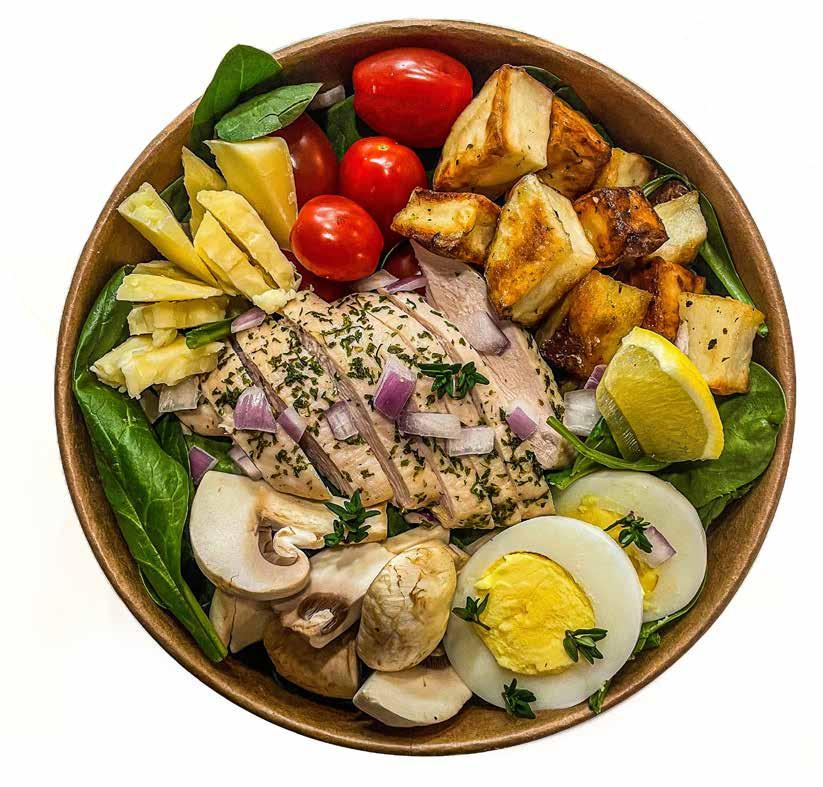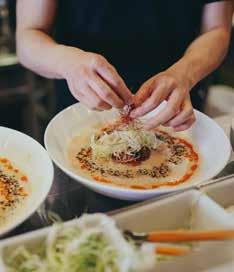
5 minute read
Cheap, Fast, AND Good
BY ADRIANNE LOVRIC
Chef's Earth
Advertisement
The saying goes that you can
only have two of the three. But when it comes to quick service dining there are plenty of local options that are not only serving up a hat-trick, but also boosting the Alberta economy. It is possible to do good, while also enjoying good food that is quick, and reasonably priced. And several locally owned businesses are finding success with this model.
“We’ve seen locally sourced ingredients in the fine dining scene for two decades, but not in approachable, every day eating until more recently,” says Michael Dekker, a partner in Calgary’s Saucy Burger and culinary instructor at SAIT. “Our goal with Saucy is to bring a faster food concept to people where they can eat locally sourced food in something as approachable as a burger, at a reasonable price point.”
Saucy’s price point is competitive with fast food chains, but the difference is in the suppliers. Sourcing locally has become more important than ever as food prices increase and supply chains are disrupted. Saucy sources the majority of its ingredients from at least four Alberta businesses with the goal of growing together. “It’s about making great partnerships with local producers and supporting the local economy so that hopefully we can bring some stability to the market and affordability from our own backyard,” says Dekker. “When we shrink the whole system down to a more local system, it’s more sustainable in the long term, and we get better products — which is why high- end, and now quick service restaurants, source locally.”
Part of the secret to the success of quick service restaurants being able to source locally is that they are specializing in one style of food with different variations, says Koki Aihara,

Saucy Burger
owner of Shiki Menya. Since opening in 2014, Aihara has kept the concept of his restaurant consistent: the best quality food, reasonably priced, served quickly. “Ramen is meant to be fast food, but it’s a lengthy process to prepare,” he says. To achieve its signature strong flavours, ramen broth takes 20 hours to make, and meats are braised for up to five hours.
“It is a hearty meal, that is meant to be enjoyed quickly. But the process can’t be cheated.” He adds that by producing a limited quantity of ramen each day, they know exact quantities of food needed, which is part of the reason they are able to source many of their ingredients locally. “For us it allows us to use the highest quality ingredients. We know where our meat and our microgreens are coming from, and we make our noodles in house.”
Similarly, Hickory Street owner, Devynn Bohn, started a food truck and subsequently a restaurant with a focused approach on creating authentic southern barbecue, that is affordable and uses ingredients sourced near her Stirling, Alberta location. “We’ve always said we don’t settle for mediocrity, so making sure our food is top quality has always been a priority,” says Bohn. Hickory Street’s food truck was the perfect starting point for producing quality food, quickly, at reasonable prices. “No one likes to wait around a food truck forever,” laughs Bohn, who applied the same approach to her restaurant, which opened as the pandemic hit.
To continue feeding southern Albertans’ appetite for BBQ, Hickory Street really relied on their local suppliers. “We have purposely sourced as local as we can,” says Bohn. Chickens come from a farm 10 minutes away, and a small local bakery produces their buns, pizza crusts and seasonal pies. “We try to help people understand that locally sourced ingredients produce not just better ingredients but also support and create your own little economy, which is super important as we’ve learned during the pandemic.”
Both The Butchery by RGE RD owner, Blair Lebsack and Chef’s Earth Inc. owner, Kevin Birch, can attest to the importance of local supply chains to meet the demand for good, fast, affordable food. “The best thing about us purchasing the way we have for the last nine years is that we have our supply chain in place with our local farms growing our vegetables, and raising our meat,” says Lebsack. Although Lebsack’s
higher end restaurant RGE RD is only now slowly returning to normal, its offshoot, The Butchery, which opened in Edmonton just over 13 months ago, has flourished during the pandemic.
The Butchery showcases whole animal butchery in a market-style setting and features the highest quality products from their kitchen and community. Although The Butchery's offerings include fast food items like hotdogs, sausage rolls and made-to-order sandwiches, they are also enabling their customers to dine at home with onthe-spot custom meat cuts, homemade soups and stocks, and pre-cooked items such as meatloaf that can be reheated at home.“People are being very savvy about where they are spending their money right now. We hear the word value a lot,” says Lebsack who adds that his customers are willing to pay a little more for a better, locally sourced product that enables them to eat properly.
Similarly, Chef’s Earth draws on local suppliers, many of which share Birch’s Calgary Farmer’s Market location, to create chef-crafted fast but naturally true food in the form of bowls and wraps, as well as custom designed takeand-make, and frozen meals, filled with wholesome ingredients. “We’re offering foods that would take you a long time to purchase and prepare, served in a familiar way. It’s real food,” says Birch, adding that he saw a 67 percent increase in his business when COVID hit as the pandemic increased people’s need for and awareness of good nutrition and good food.
Although the speed and price of food is important, Birch says people are also more conscious of what they are putting into their bodies. “The younger generation is eating more consciously and are more environmentally aware. They want to know about the preparation and quality of the ingredients — where they are coming from and how the meat is being raised.”

Shiki Menya

Hickory St
Adrianne Lovric is a communications professional who has spent the last 20 years creating content for print media, non-profits, creative agencies, start-ups and publicly-traded companies. Adrianne lives in Calgary with her husband, Miroslav, and their two daughters.










